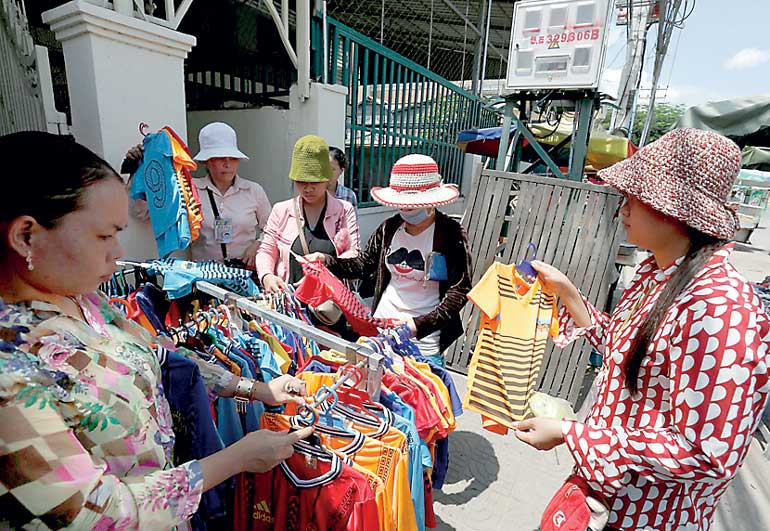Sunday Feb 22, 2026
Sunday Feb 22, 2026
Wednesday, 14 October 2015 00:00 - - {{hitsCtrl.values.hits}}
 Garment workers look at shirts at a clothing stall after their lunch time in Phnom Penh - Reuters
Garment workers look at shirts at a clothing stall after their lunch time in Phnom Penh - Reuters
PHNOM PENH (Reuters): Cambodia agreed last week to raise the monthly minimum wage for its crucial textiles sector to $140 from next year, short of demands by trade unions long at odds with the government over pay.
The decision was made in a vote by representatives of the government, factories and unions, with the majority supporting an increase to $135 a month from $128. The government then raised that to $140.
Pay for the 600,000 people who work in mostly Asian-owned factories, churning out clothes and shoes for the likes of Gap , Nike, Adidas, H&M and Inditex has been a thorny issue in impoverished Cambodia.
The $5 billion sector is Cambodia’s most important but strikes in recent years have worried brands enticed by lower costs than powerhouse China.
Major unions had been seeking a minimum wage of $160 a month, having scaled down an initial demand from $177, and threatened strikes. It was unclear if they would follow through.
“This figure is reasonable and acceptable. Even it’s not acceptable to all, we have no choice,” Labour Minister Ith Sam Heng told reporters.
He said Prime Minister Hun Sen took the decision himself to raise the agreed wage by a further $5.
Textiles growth has been one of Hun Sen’s top achievements, but his government has clashed repeatedly with unions and its violent crackdown on strikes has seen union support shift towards his political opponents.
Ath Thon, president of the 78,000-strong Coalition of Cambodian Apparel Workers’ Democratic Union, chided factories and some unions for siding with the government.
“We will have meetings with our colleagues about what to do next,” he said. “We didn’t succeed in votes because most people have political leanings toward the government and companies.”
The government has a tricky balancing act to keep Cambodia competitive, and stable. Though its wages are low, it faces strong competition from neighbouring Vietnam, which last year shipped $31 billion in garments and shoes for the same brands that use Cambodian factories.
Vietnam’s textiles exports to the United States, Cambodia’s biggest market, will be tariff-free once a Trans-Pacific Partnership (TPP) agreed on Monday comes into effect.
“If the industry starts to suffer, then I think a huge part of the responsibility has to be borne by the unions themselves,” said Ken Loo, Secretary General of the Garment Manufacturers Association in Cambodia. “From past experience, buyers won’t accept (higher) prices.”